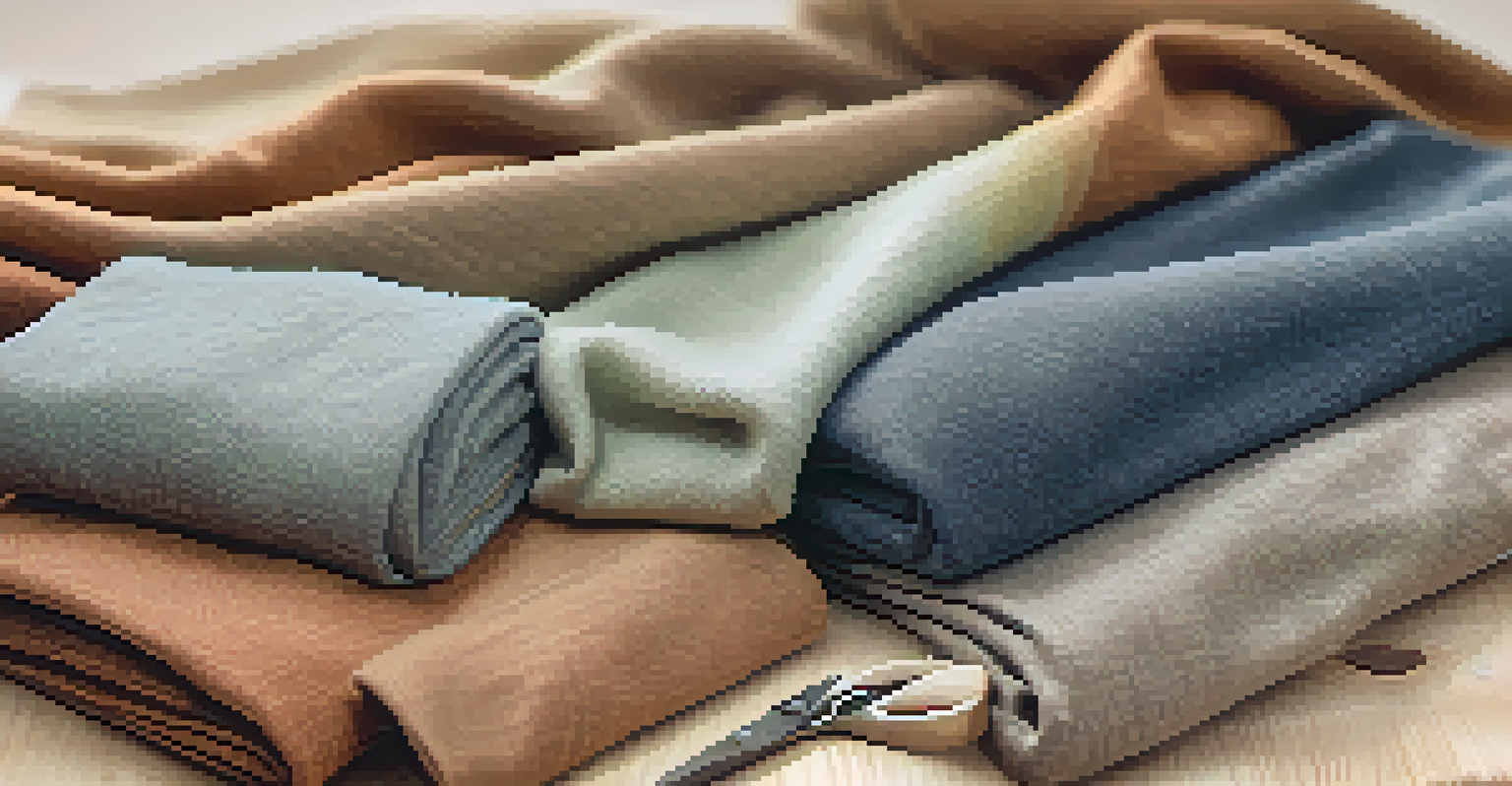Consumer Responsibility: Making Eco-Friendly Fashion Choices

Understanding Consumer Responsibility in Fashion
Consumer responsibility in fashion goes beyond just purchasing items; it involves being mindful of the environmental and social impacts of our clothing choices. Every time we buy a piece of clothing, we influence the industry and its practices. This means understanding the entire lifecycle of fashion products, from production to disposal, and making choices that reflect our values.
Fashion is the armor to survive the reality of everyday life.
For instance, opting for brands that prioritize sustainable materials and ethical labor practices is a way to exercise this responsibility. By choosing eco-friendly options, we support companies that are committed to reducing their carbon footprint and improving working conditions. This not only benefits the environment but also promotes a fairer economy for workers worldwide.
Ultimately, being a responsible consumer means making informed decisions that contribute to a healthier planet. It’s about recognizing that our choices matter and that each purchase can either support or undermine sustainable practices in the fashion industry.
The Impact of Fast Fashion on the Environment
Fast fashion has revolutionized the clothing industry, but it comes at a significant environmental cost. The rapid production cycles lead to excessive waste, as millions of garments end up in landfills each year. Not to mention, the manufacturing processes often consume vast amounts of water and energy, contributing to pollution and resource depletion.

For example, the production of a single cotton t-shirt requires about 2,700 liters of water, which could supply one person with drinking water for 2.5 years. This shocking statistic highlights the urgency of addressing fast fashion’s detrimental effects and encourages consumers to think twice before purchasing low-cost, trendy clothing.
Consumer Choices Shape Fashion
Being mindful of our clothing purchases influences the fashion industry's environmental and social practices.
By becoming aware of these impacts, consumers can take steps to reduce their contribution to fast fashion. Choosing to buy less, invest in quality pieces, or shop second-hand are all effective strategies to combat this issue and promote a more sustainable fashion industry.
Choosing Sustainable Fabrics: A Smart Move
When it comes to eco-friendly fashion, the choice of fabric plays a crucial role. Sustainable fabrics, such as organic cotton, hemp, and Tencel, are produced with fewer chemicals and less water than conventional materials. These alternatives not only have a smaller environmental footprint but are also often more durable, providing better value over time.
The greatest threat to our planet is the belief that someone else will save it.
For instance, organic cotton is grown without synthetic pesticides or fertilizers, making it a healthier choice for both the planet and the farmers who cultivate it. By opting for clothing made from sustainable fabrics, consumers can help reduce pollution and support agricultural practices that are better for the Earth.
Moreover, many brands are now exploring innovative materials, such as recycled fibers and vegan leathers, to further enhance their sustainability efforts. By choosing products made from these fabrics, consumers are not only making a fashion statement but also encouraging the industry to embrace more environmentally responsible practices.
The Role of Second-Hand Shopping in Eco-Fashion
Second-hand shopping is a fantastic way to embrace eco-friendly fashion while also discovering unique pieces. By purchasing pre-loved clothing, consumers help extend the lifecycle of garments and reduce the demand for new production. This practice not only minimizes waste but also promotes a circular economy where items are reused rather than discarded.
Thrift stores, consignment shops, and online platforms have made it easier than ever to find stylish second-hand options. You might stumble upon vintage treasures or high-quality brands at a fraction of the original price. Plus, shopping second-hand can be a fun and rewarding experience, allowing you to express your personal style without contributing to the fast fashion cycle.
Fast Fashion Hurts the Planet
The rapid production cycles of fast fashion lead to significant waste and environmental degradation.
Additionally, supporting local thrift shops can have a positive impact on communities. Many of these stores fund charitable initiatives, creating a win-win situation where your fashion choices also contribute to social good.
Supporting Ethical Brands: A Key to Change
One of the most impactful ways consumers can make eco-friendly fashion choices is by supporting ethical brands. These companies prioritize sustainable practices, fair labor conditions, and transparency in their supply chains. By choosing to shop from these brands, consumers send a clear message that they value ethical production and are willing to invest in responsible practices.
Researching a brand's values and initiatives can reveal much about their commitment to sustainability. Many ethical brands provide detailed information on their sourcing, manufacturing processes, and environmental impact. This transparency helps consumers make informed choices that align with their values.
Moreover, as more consumers demand sustainable practices, even larger fashion retailers are beginning to adapt. By supporting ethical brands, we can encourage the entire industry to shift towards more responsible practices, ultimately benefiting the environment and society as a whole.
The Power of Minimalism in Fashion Choices
Adopting a minimalist approach to fashion can significantly enhance eco-friendly choices. Minimalism encourages consumers to focus on quality over quantity, leading to a more intentional wardrobe filled with versatile, timeless pieces. This not only reduces clutter but also lessens the environmental impact associated with frequent shopping.
Think about it: when you invest in a few high-quality items that you truly love, you’re less likely to fall into the trap of fast fashion. This approach encourages mindful consumption, where you consider the longevity and versatility of each piece before making a purchase. It also promotes creativity in styling, as you learn to mix and match what you have.
Support Ethical Brands for Impact
Choosing to shop from ethical brands promotes sustainable practices and encourages positive change in the fashion industry.
Ultimately, minimalism in fashion not only simplifies your life but also contributes to a more sustainable future. By embracing this lifestyle, you can make a lasting impact on the environment while enjoying a more fulfilling relationship with your wardrobe.
Educating Yourself and Others About Fashion Sustainability
Education is a powerful tool in promoting eco-friendly fashion choices. By educating yourself about the impacts of the fashion industry and the importance of sustainability, you can make more informed decisions. Knowledge about sustainable practices, ethical brands, and the consequences of fast fashion empowers consumers to take action.
Furthermore, sharing this knowledge with friends, family, and your wider community can create a ripple effect. Conversations about the importance of eco-friendly fashion can inspire others to rethink their shopping habits and encourage them to explore sustainable options. Social media platforms also provide an excellent avenue for spreading awareness and supporting like-minded initiatives.

By fostering a culture of sustainability, we can collectively push for change in the fashion industry. The more we talk about these issues, the more likely we are to influence others and promote responsible consumer behavior.
Creating a Sustainable Fashion Future Together
Creating a sustainable fashion future requires collective action from consumers, brands, and policymakers alike. As individuals, we can make conscious choices, but for lasting change, we need to advocate for systemic shifts in the industry. This means supporting policies that promote sustainability and hold brands accountable for their practices.
Engaging with local communities and initiatives can also amplify our impact. Participating in clothing swaps, community clean-ups, or supporting local artisans are all ways to contribute to a more sustainable fashion landscape. These activities not only reduce waste but also foster connections within our communities.
Ultimately, the journey towards eco-friendly fashion is a shared responsibility. Together, we can cultivate a culture of sustainability that values ethical practices, preserves our planet, and inspires future generations to make responsible choices.